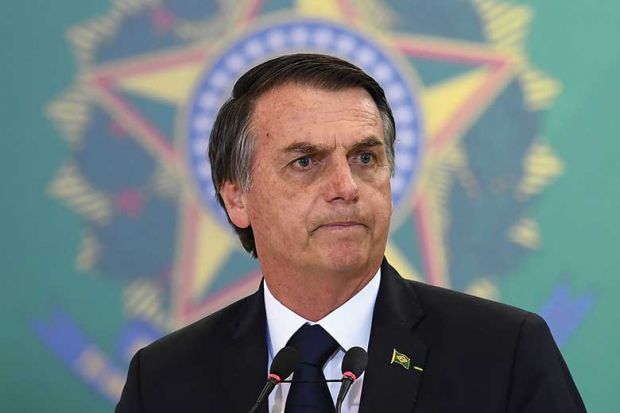Claims that Brazil’s new far-right president will force candidates for publicly funded scholarships to take an “ideology” test have provoked alarm among academics, in a sign of the anxiety gripping campuses since the installation of Jair Bolsonaro.
Capes, Brazil’s federal postgraduate funding body, was forced to release a statement stating that there would be “no undertaking” of the exam. It was mooted in an article in leading newspaper O Globo, which stated that “new measures are being considered by the Ministry of Education” for the allocation of master’s and doctoral scholarships to students at home and going abroad, including an “ideological criterion”.
“Also discussed is the possibility of stopping some scholarships already granted,” the article continued.
Scholars reacted angrily to the story, which was said to be based on information leaked by a government source, condemning it as an “attack on freedom” and an indication of things to come under Mr Bolsonaro’s presidency.
Some of Mr Bolsonaro’s followers have pledged to campaign against the “corrupt ideologies” of academia, and military police have reportedly confiscated teaching materials from campuses on the grounds that they contained “leftist propaganda” and “false information” about Brazil’s political history.
In particular there are concerns that plans to censor teaching about Brazil’s former military regime at school level will spread to universities.
Adriana Marotti de Mello, professor of business at the University of São Paulo, said that the scholarships rumour was “a nuisance” but was unlikely to come to pass because universities still had some autonomy in determining how they award scholarships. But there was, she continued, a deeper concern that policy rumours were being leaked by politicians with the intention of upsetting the university community.
“This is…intimidation, bullying,” she said. “They are trying to create an atmosphere of panic and intimidation for opposition.”
Another researcher, who asked not to be named, said that the opening weeks of Mr Bolsonaro’s presidency had brought “quite a bit of ‘gaslighting’”.
“The government announces something outrageous, throws it to the mainstream press, then watches it sink and disappear so that the media appears discredited. This just happened with a series of measures for the guidelines for teaching textbooks that were very extreme,” the researcher explained.
Academics have also expressed concern about the appointment of Ricardo Vélez-Rodriguez, a Colombian-born philosophy professor at an elite military school, as Brazil’s education minister. He was selected over the former favourite to win the role, Mozart Ramos, after Professor Ramos spoke against a controversial “Schools without Political Parties” initiative imposed in Brazilian classrooms with the aim of preventing the perceived “leftist indoctrination” of students.
Roberto Arruda, director of international student academic success at the University of Colorado Boulder and an expert on Brazil’s internationalisation programmes, said that it was “absolutely understandable” for educators to be on guard. “Academic freedom is a major concern,” he said. “We haven’t seen such concern [for] academic freedom since the military dictatorship ended…there is a fear of the government interfering in what can be discussed in the classroom.”
Register to continue
Why register?
- Registration is free and only takes a moment
- Once registered, you can read 3 articles a month
- Sign up for our newsletter
Subscribe
Or subscribe for unlimited access to:
- Unlimited access to news, views, insights & reviews
- Digital editions
- Digital access to THE’s university and college rankings analysis
Already registered or a current subscriber? Login








